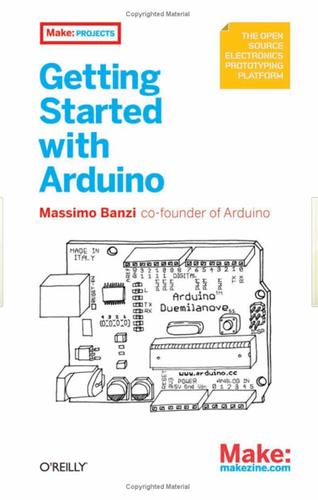Paperback
Published Oct. 15, 2008 by Make Books.

Paperback
Published Oct. 15, 2008 by Make Books.
The Arduino Hardware The Arduino board is a small microcontroller board, which is a small circuit (the board) that contains a whole computer on a small chip (the microcontroller). This computer is at least a thousand times less powerful than the MacBook I’m using to write this, but it’s a lot cheaper and very useful to build interesting devices. Look at the Arduino board: you’ll see a black chip with 28 “legs”—that chip is the ATmega168, the heart of your board. We (the Arduino team) have placed on this board all the components that are required for this microcontroller to work properly and to communicate with your computer. There are many versions of this board; the one we’ll use throughout this book is the Arduino Duemilanove, which is the simplest one to use and the best one for learning on. However, these instructions apply to earlier versions of the board, …
The Arduino Hardware The Arduino board is a small microcontroller board, which is a small circuit (the board) that contains a whole computer on a small chip (the microcontroller). This computer is at least a thousand times less powerful than the MacBook I’m using to write this, but it’s a lot cheaper and very useful to build interesting devices. Look at the Arduino board: you’ll see a black chip with 28 “legs”—that chip is the ATmega168, the heart of your board. We (the Arduino team) have placed on this board all the components that are required for this microcontroller to work properly and to communicate with your computer. There are many versions of this board; the one we’ll use throughout this book is the Arduino Duemilanove, which is the simplest one to use and the best one for learning on. However, these instructions apply to earlier versions of the board, including the more recent Arduino Diecimila and the older Arduino NG. The figure on the left below shows the Arduino Duemilanove; The figure on the right shows the Arduino NG.
Product Description This valuable little book offers a thorough introduction to the open-source electronics prototyping platform that's taking the design and hobbyist world by storm. Getting Started with Arduino gives you lots of ideas for Arduino projects and helps you get going on them right away. From getting organized to putting the final touches on your prototype, all the information you need is right in the book.
Inside, you'll learn about:
* Interaction design and physical computing * The Arduino hardware and software development environment * Basics of electricity and electronics * Prototyping on a solderless breadboard * Drawing a schematic diagram
And more. With inexpensive hardware and open-source software components that you can download free, getting started with Arduino is a snap. To use the introductory examples in this book, all you need is a USB Arduino, USB A-B cable, and an LED.
Join the tens of thousands of hobbyists who have discovered this incredible (and educational) platform. Written by the co-founder of the Arduino project, with illustrations by Elisa Canducci, Getting Started with Arduino gets you in on the fun! This 128-page book is a greatly expanded follow-up to the author's original short PDF that's available on the Arduino website.